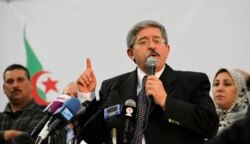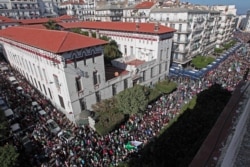Two days before Algeria's December 12th presidential election, the country's judicial system has sentenced two former prime ministers to 12 and 15 years in prison, respectively, for corruption. Both were close allies of former President Abdel Aziz Bouteflika. Several other top former government ministers were also given heavy sentences in the high profile case.
The prison sentences handed down against former Prime Ministers Ahmed Ouyahia and Abdel Malek Sellal were harsh, given that no former Algerian prime minister has ever been put on trial before.
Ouyahia received a 15-year sentence, while Sellal received 12 from Algeria's Sidi Ahmed Court. Several other former ministers were given heavy sentences in the corruption case involving automobile manufacturing.
Algerians are due to go to the polls Thursday to elect a new president to succeed longtime former President Abdel Aziz Bouteflika, who stepped down in April, citing poor health. Bouteflika had been expected to run for a fifth term that same month, before elections were postponed due to widespread popular protests.
Dr. Paul Sullivan, a professor at the U.S. National Defense University, tells VOA that he thinks the sentences are intended to "give (Algerians) the impression of the rule of law.....so that their votes may be less radical."
"The Algerian people," he says, "sees the gangrenous rot of the political system and need real change to move towards a better future."
Algerian political analyst Arabi al-Zawak told Saudi-owned al Arabiya TV that the corruption case against the former government officials was meant to show voters that the country's military would "no longer tolerate the corruption of the Bouteflika era."
"It is legitimate for businessmen to make a profit," he said, "but public officials are expected to serve the people."
Large popular protests against the elections took place Monday in the coastal city of Oran, as well as the capital Algiers. Many Algerians believe that the five candidates running for president, two of whom are former prime ministers, do not represent a serious break with the Bouteflika-era or the country's post-independence regime.
Algeria's military commander, Army Chief of Staff Gen. Ahmed Qaid Saleh, has urged Algerians to go to the polls to give the country new leaders.
Many Algerians, especially the military, worry that there could be a repeat of the chaos and violence of the 1990s, following an aborted presidential election won by Islamist Abbassi Madani.
Election turnout at Algerian consulates in Paris and several other European capitals is reported to be light.






